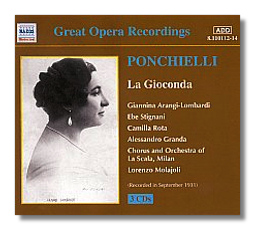
The Internet's Premier Classical Music Source
Related Links
- Latest Reviews
- More Reviews
-
By Composer
-
Collections
DVD & Blu-ray
Books
Concert Reviews
Articles/Interviews
Software
Audio
Search Amazon
Recommended Links
Site News
 CD Review
CD Review
Amilcare Ponchielli

La Gioconda
- With arias by Rossini, Bellini, Donizetti, and Verdi
Giannina Arangi-Lombardi (Gioconda)
Ebe Stignani (Laura)
Alessandro Grandi (Enzo)
Gaetano Viviani (Barnaba)
Camilla Rota (La Cieca)
Corrado Zambelli (Alvise)
Orchestra & Chorus of La Scala, Milan/Lorenzo Molajoli
Naxos Historical 8.110112-14 ADD monaural 3CDs: 49:02, 71:17, 78:34
Amilcare Ponchielli's La Gioconda is a strange opera. Its most famous highlight, The "Dance of the Hours," is purely orchestral. The titular heroine isn't given the score's most rewarding vocal music (with the exception of "Suicidio!," and by then the opera is almost over), and she is asked to bring dramatic verisimilitude to the most unlikely situations. In Act II, she is on the verge of jealously stabbing the hapless mezzo (Laura), when she realizes that Laura saved the life of Gioconda's blind mother; Gioconda then spends the rest of the opera saving Laura from "Perils of Pauline" misadventures, only to see her sail off at the end with Gioconda's lover Enzo, the tenor. She then stabs herself, rather than submitting to the erotic attentions of Barnaba, the evil baritone. It is hard to believe that a playwright of Victor Hugo's caliber was responsible for a plot this creaky, and that the librettist was Arrigo Boito (under the anagram pseudonym of "Tobia Gorrio.")
This recording was made by Italian Columbia in 1931; I believe it was Gioconda's first complete recording, and it still has its decided strengths, particularly for people who want to hear how Italian opera was sung by Italians – no small virtue – immediately before World War Two. It was released on nineteen 78-rpm discs, and so it was unaffordable to the average record-buyer of the time. Now, Naxos is offering the same recording (plus a considerable bonus) for about the price of two movie tickets and popcorn, and of course it is a lot more portable, durable, and convenient in the CD medium. The transfers, affected by Ward Marston, were done from mint-condition pressings. The sound is so vivid one hardly believes that electrical recordings had been developed only six years earlier.
The title role usually goes to sopranos with heftier voices; Zinka Milanov, Eva Marton, and Maria Callas are the first that come to mind. Arangi-Lombardi, while not underpowered in this role, is the most vulnerable Gioconda on discs, with the possible exception of Montserrat Caballé. Although I don't find her characterization per se to be gripping, there's no denying that she had a beautiful voice and a superb grasp of the requisite style. The bonus of ten arias (from William Tell, Norma, Lucrezia Borgia, I Lombardi, Ernani, and La Forza del destino) on the third disc is most welcome. Her weakness seems to be coloratura – she smudges parts of "Casta diva" – but of course this is not an issue in Ponchielli. Tenor Alessandro Grandi is a little lachrymose in the style of Gigli. Nevertheless, he has a brilliant voice and he uses it with ardor. The villains are memorably portrayed by Zambelli and by the black-voiced Viviani. (Although Viviani was a baritone, his voice has some of the colors found in bass Ezio Pinza's voice at that time.) Camilla Rota is a memorable La Cieca – her vibrato is wide enough to steer a gondola through, but it works – and Ebe Stignani, at the very start of her career, is a fine Laura. Paradoxically, her voice often seems brighter than Arangi-Lombardi's. The conducting is energetic and unfussy. Naxos' annotations suggest that Molajoli might have been a pseudonym used by a famous conductor on contract to another recording studio. I've never seen this suggested before, but it is an intriguing statement to make.
Naxos' booklet offers a plot synopsis tied to tracking points, but no text or translations. Paul Campion's annotation is full of interesting facts and opinions.
Copyright © 2001, Raymond Tuttle


















